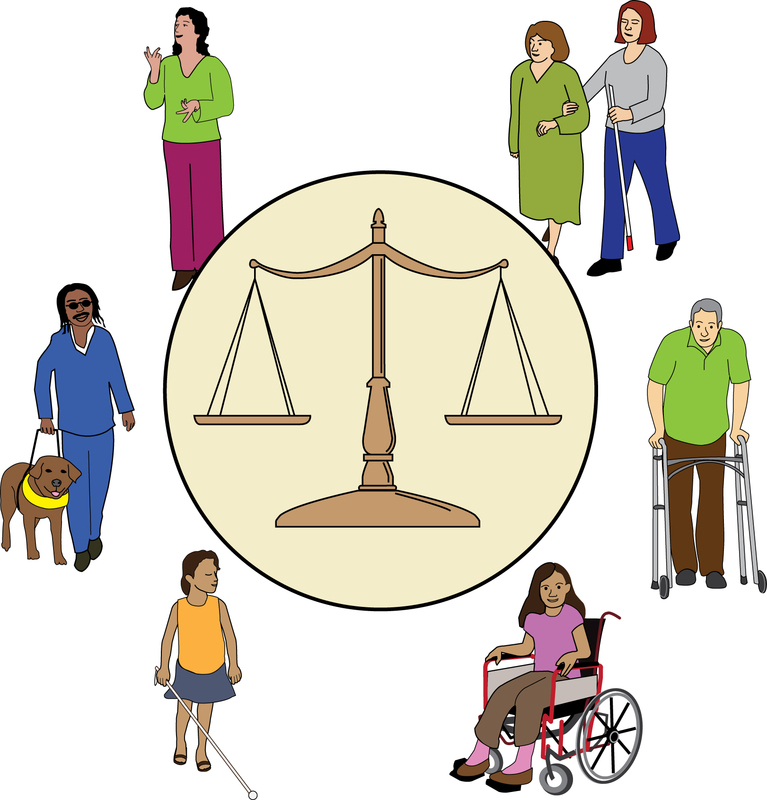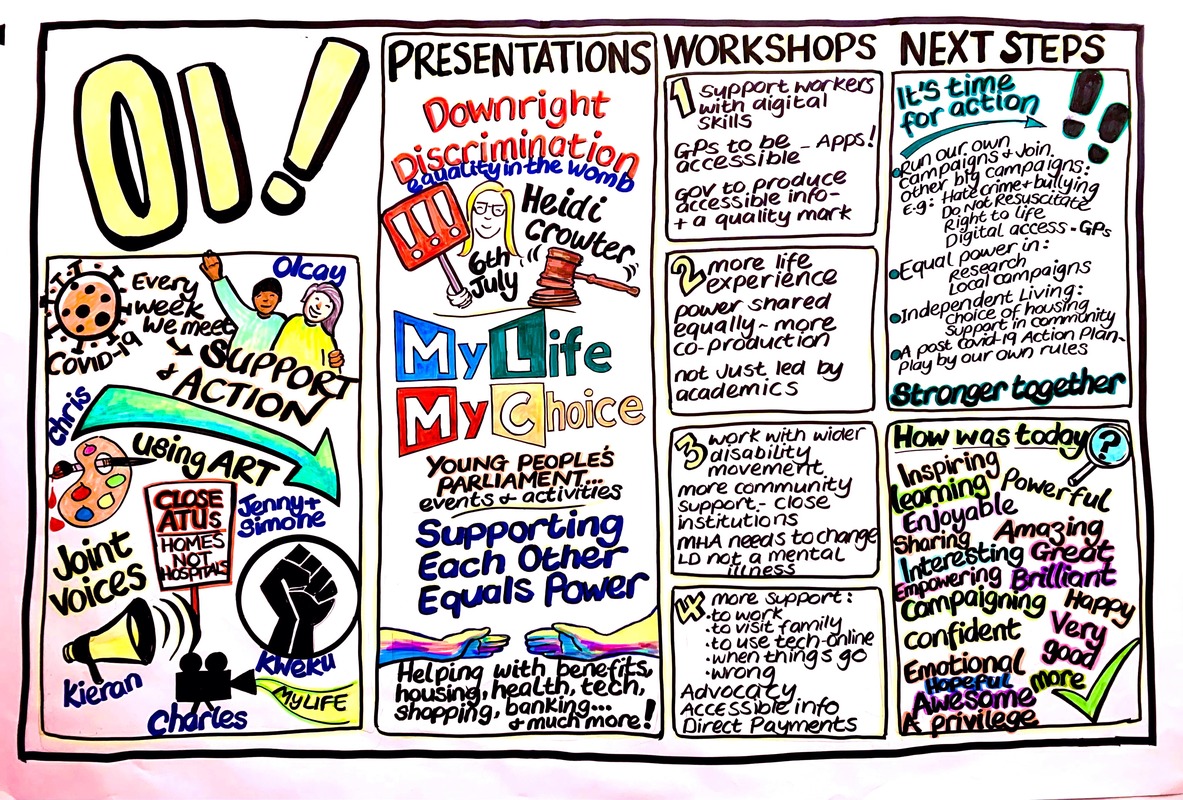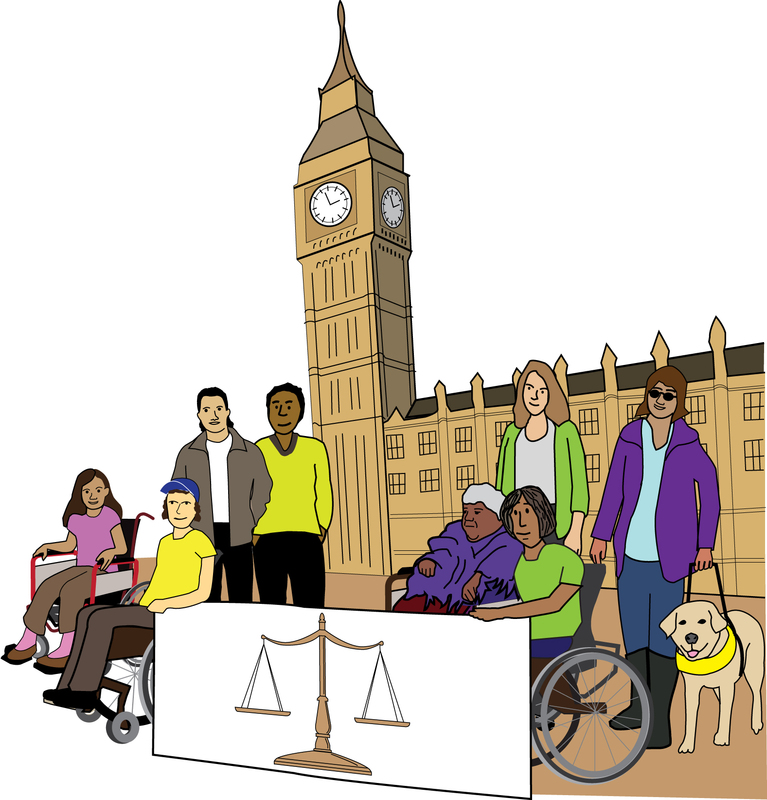
Our History
People First (Self Advocacy) was the first national user-led self-advocacy organisation run and controlled by people with learning difficulties. Self-advocates travelled to a conference in Canada about self-advocacy and brought this learning back to the UK to set up People First (Self Advocacy) in 1984.
People First became a company limited by guarantee in 1995 and a registered charity in 1996. However, becoming a charity run by people with learning difficulties was a challenge. We had to prove to the Charity Commission that we could run our own charity.
We were then one of the first charities to use the government scheme, Access to Work, to support staff with learning difficulties at work. Previously it had not been acknowledged that people with learning difficulties could hold professional positions or that they should be entitled to support at work. It was a battle to get support and we still face a number of barriers when applying for this support.
See a timeline of the our history and some of our achievements below.
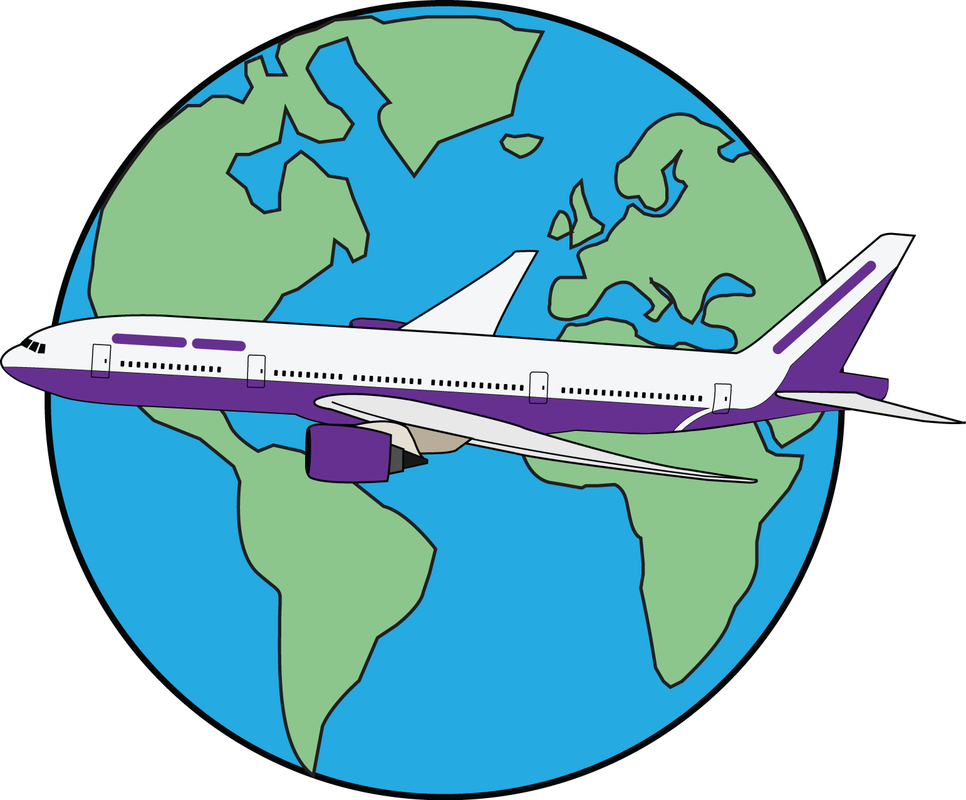
1980s
- The Jay Report, published in 1979, said that 'the lives of people with learning disabilities should be normal and they should be part of their communities. This was based on an idea called ‘Normalisation’ that had been followed in Denmark since the late 1950s'. By the mid-80s, many of the large hospitals had started to close around the country and people moved to residential care homes in the community.
- In 1980 the term 'People with Mental Handicap' label for people with learning difficulties was introduced. This replaced previous terms such as 'subnormal' and 'severely subnormal' and 'mental defective' and 'mental deficiency'.
- In 1984 self-advocates from the UK travelled to a conference in Canada about self-advocacy and brought this learning back to the UK. Soon after, People First (Self Advocacy) was set up by people with learning difficulties and became the first self-advocacy organisation run and controlled by people with learning difficulties in the UK.
- In 1985 the term 'People with learning difficulties' and 'People with Learning Difficulties' was adopted by self-advocacy groups.
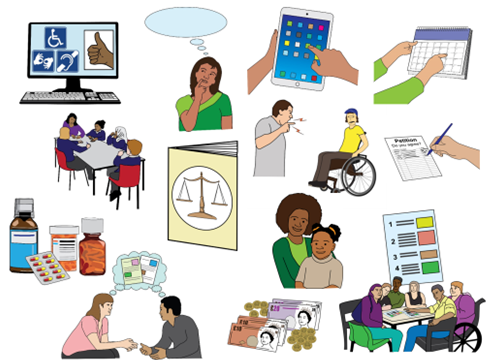
1990s
- In 1990 People First brought out our first picture bank called "Access First". We also started campaigning for the wider use of Easy Read which is now an accepted and well-known accessible format.
- In 1990 the NHS and Community Care Act said that care should be provided by a range of services and individual care packages designed. For the first time, people with learning disabilities were also entitled to Direct Payments, meaning they could choose the services they wanted.
- In 1990 the Department of Health adopted the term term 'people with learning disabilities'.
- In 1994 the first ‘England People First’ Conference was held and Black People First was set up.
- In 1995 People First was part of the campaign to pass the Disability Discrimination Act. We were part of this campaign because an up-to-date law was needed to stop discrimination against disabled people in the UK. People First with the rest of the disability movement carried out many different demonstrations and campaigns to make the government bring in a new law.
- In 1995 People First became a company limited by guarantee on 6th December.
- In 1996 People First became a registered charity on 6th August. This was a big step forward because at the time it was thought that people with learning difficulties could not run their own organisation.
- In 1996 after being told that people with learning difficulties could not use Access to Work, we campaigned to have our support needs at work met. We had to point out that if Access to Work would not pay for support for people with learning difficulties, then they would be breaking the Disability Discrimination Act. We became one of the first organisations run and controlled by people with learning difficulties to get Access to Work support.
- In 1999 Andrew Lee became the Director of People First.
- In 1999 the People First Director and Chair were the first people with learning difficulties to be a part of the Disability Rights Commission. The Director then continued to be a part of the Equality and Human Rights Commission (EHRC), Disability Committee.
- In 1999 People First was involved in the Alpha Nova project, which was working with self-advocates across Europe. The outcome of the project was the setting up of the first self-advocacy groups in Austria and Malta.
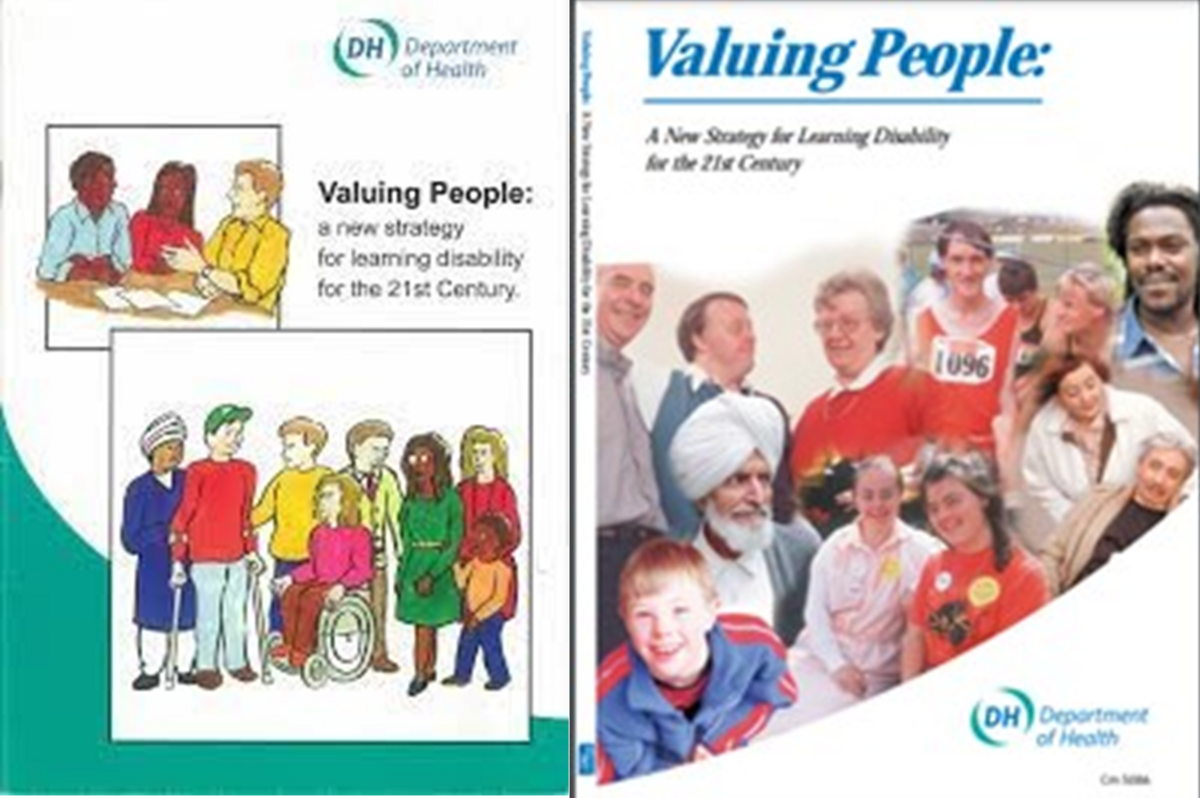
2000s
- In 2000 People First got funding from the Department of Health to run a national project. The final report was sent to the Department of Health and led to the development of the Valuing People white paper.
- In 2001 ‘Valuing People: A New Strategy for Learning Disability for the 21st Century’ was published. It was the first white paper about learning disabilities for 30 years. It was based on 4 key principles: rights, independence, choice and inclusion.
- In 2002 People First was involved in the development of the Valuing People white paper. Our then Chair, Carole Lee, received an MBE for her work in Valuing People.
- In 2004 People First campaigned with other Disabled People’s Organisations (DPOs) to make sure mental capacity advocates and the right to an independent advocate were included in the Mental Capacity Act. We successfully campaigned for the Act to be called the Mental Capacity Act rather than the Mental Incapacity Act. The Mental Capacity Act 2005 came into force in 2007.
- In 2009 'Valuing People Now’ was brought out to set new goals to support more people with learning disabilities to get homes and jobs and lead fulfilled lives.
2010s
- In 2010 the Equality Act came into force providing a law to tackle all forms of discrimination.
- In 2010 People First Director Andrew Lee was a member of the Equality and Human Rights Commission (EHRC) and also a board member of UK Disabled People's Council (UKDPC) who were independently reviewing the UN Convention on the Rights of Persons with Disabilities (UNCRPD). He was also Co-Chair of the Learning Disability Coalition (LDC).
- In 2011 the Disability LIB national capacity building project came to an end. We worked with over 30 local self-advocacy groups and organisations. This project helped us to support self-advocacy groups and build helpful resources.
- In 2011 People First was involved in the Independent Living Campaign, set up in response to the then planned closure of the Independent Living Fund (ILF).
- In 2011 BBC Panorama exposed the abuse of residents at Winterbourne View Hospital in South Gloucester. Shockingly we have seen many more since then.
- In 2012 People First joined the Reclaiming Our Futures Alliance (ROFA).
- In 2013 People First launched the 'Cuts Impact Action Now' project and the 'Advocacy, Signposting and Advice' (ASA) service. The final report was launched at Inclusion Barnet's Annual General Meeting (AGM) in January 2016.
- In 2014 People First received a grant from the Office of Disability Issues Facilitation Fund. We were able to update the Picture Bank and offer it to other organisations for a sliding scale fee.
- In 2014 People First made our first submission to the England Civil Society Shadow Report to the UN Committee about how well the Government was meeting the UN Convention on the Rights of Persons with Disabilities (UNCRPD). We also supported five other groups to make submissions.
- In 2014 People First campaigned with other Disabled people's organisations to make sure the right to an independent advocate was included in the Care Act 2014.
- In 2015 People First set up the Easy Read One Stop Shop and launched a new website with the help of an Awards for All grant.
- In 2015 People First members set our three main campaign priorities at our Annual General Meeting. They have come to be known as the 3 Pillars for Access to independent living.
- In 2017 People First worked with five local member organisations to carry out their own local research on the impact that cuts and changes are having on people with learning difficulties in their area.
- In 2017 People First joined the Independent Living Strategy Group, chaired by Baroness Jane Campbell. The group was set up to look at at how to make Independent Living a right in UK law.
- In 2018 the Supporting Each Other Equals Power (SEOEP) project started. SEOEP was a Big Lottery Fund funded the project which ran for four years from January 2018 to December 2021. The project took place in Lambeth, south London and was a partnership between Social Care Institute for Excellence (SCIE), People First (Self Advocacy) and Breaking Out of the Bubble (BOB, formerly People First Lambeth).
- In 2018 People First started working with Inclusion London to raise awareness about changes to the the Mental Capacity Amendment Bill. No accessible information about the Bill was produced and the Government did not work with Disabled people or their organisations when planning the changes. We were very worried that the Amendment Bill would weaken safeguards. We ran an accessible consultation event, we met with MPs, and we worked with 10 self-advocacy groups from around the country to get a meeting with the Bill Team and Minister of State for Care.
- In 2018 People First was asked to become a member of the DWP Ministerial Taskforce on Alternative Formats. The last meeting of this group took place in December 2021.
- In 2019 the Mental Capacity (Amendment) Act 2019, the deprivation on liberty safeguards (DoLS) was replaced by the liberty protection safeguards (LPS). Through our campaigning work we were able to influence some important changes to the Bill, including people having the right to accessible information, the right to an advocate, and that hospital and care home managers will have less power when deciding what care and support someone needs.
- In 2019 People First received funding from Portsmouth Council to support a group of self-advocates to set up the local self-advocacy group, Stepping Stones to Positivity.
- In 2019 People First fed into ROFA's 'Independent Living for the Future: Our vision for a national independent living support system' document. We also produced the Easy Read version of the document.
2020s
- In 2020 People First set up an Easy Read Strategy Group to look at national Easy Read Standards. We conducted a big review of our Easy Read service and started working on a new strategy to develop the Empower: Accessible Information and Communication service.
- In 2020 People First was one of the national facilitators for Engage Britain’s 100 Community Conversations about health and care. We ran three events with self-advocates in England, Scotland and Wales, working with People First Scotland and All Wales People First.
- In 2020 we set up the weekly online Covid-19 Support and Action Group for self-advocates around the country. This was immediately after the first lockdown in April. We wanted to provide a safe online space for people to share concerns, information, and ideas. It was also an opportunity to discuss the coronavirus guidance, which many people found confusing. The group produced a number of statements around their issues of concern.
- In 2020 People First became an official UK Parliament Week partner and then received training in 2021 about how Parliament works and how to engage with Parliament.
- In 2020 People First joined Learning Disability England and a group of self-advocates to work on the Accessible Information Campaign. An open letter to the Government was signed by over 300 individuals and organisations.
- In 2020 People First produced a case study 'Digital Exclusion for People with Learning Difficulties during Covid' for Hear Equality Network's digital exclusion project. This highlighted the inequalities further highlighted by Covid-19.
- In 2020 the Covid-19 Support and Action Group ran a focus group on shielding to brief the Prime Minister's daily briefing. The group also published a Black Lives Matter statement.
- In 2020 we worked with Bringing Us Together, the family carers group, on a project called Joint Voices. We co-facilitated six sessions to look at how we work with family carers equally and positively to plan how we can best campaign on stopping people being admitted to Assessment and Treatment Units.
- In 2020 People First Director Andrew Lee was invited to join Covid-19 Advisory Group for People with Learning Disabilities and Autistic People to help the Department for Health and Social Care to understand and respond to the impacts of Covid-19 on people with a learning difficulty, disability and autistic people. We helped to shape recommendations for the Social Care Taskforce report and Adult Social Care Winter Plan. The group met again in 2021 to review progress on the three main recommendations: 1. Accessible information; 2. Day support and other services which stopped during the pandemic; 3. Loneliness and exclusion.
- In 2020 People First Director Andrew Lee presented at an All Party Parliamentary Group (APPG) on Learning Disability. He spoke about the things our members told us were impacting them during the pandemic and what the Government should look at when they do their inquiry into the pandemic. We also attended the meeting dedicated to the 10th Anniversary of Winterbourne View Scandal and the Future of Transforming Care.
- In 2020 People First started working with self-advocates in Nepal. The pandemic had opened up opportunities to do more work virtually. The first programme ran over 9 months and included sessions on speaking up and developing Easy Read.
- In 2021 People First produced a report on how London self-advocacy groups coped during COVID February 2021.
- In 2021 People First submitted a response to the Reforming the Mental Health Act consultation and produced an Easy Read briefing on explaining how the changes to the Mental Health Act will potentially affect people with learning difficulties.
- In 2021 People First resigned from co-facilitating the Workforce Expert Advisory Group (Supporting Skills for Care, Health Education England and NHS England with workforce development) after 18 months. This was due to a process of recruitment being introduced at a time when people needed continuity and calm. The language of co-production was used but we felt that the practice of co-production was not. We felt strongly that this should be challenged.
- In 2021 the Covid-19 Support and Action Group ran online 'Oi-Out in Front' conference with over 100 people attending. Inclusion London provided technical support.
- In 2021 People First secured a 2-year National Lottery Community Fund Leaders with a Lived Experience grant. This was to develop our digital systems and develop a new website.
- In 2021 People First took part in the project, led by four Deaf and Disabled people’s Organisations (DDPOs), to produce a UNCRPD - England Civil Society Shadow Report. This was for the UK's second examination into how far the UK is upholding the rights of Deaf and Disabled people inline with the United Nations Convention on the Rights of People with Disabilities (UNCRPD). People First ran one of the consultation workshops and produced the Easy Read guidance for the project.
- In 2021 the Supporting People Equals Power (SEOEP) project came to an end and we started to develop a strategy for the Advocacy Plus project. This is a peer advocacy service for people with learning difficulties.
- In 2021 People First joined a host of equality-led organisations in raising their concerns about the Government's Human Rights Act Reform: A Modern Bill of Rights consultation. This has become widely referred to as the 'Rights Removal Bill'. People First challenged the Ministry of Justice on the lack of accessible information about the consultation and the tight timescale to respond, and joined over 200 organisations as a signatory to a letter to the Joint Committee on Human Rights telling them that the Human Rights Act Reform consultation was not accessible to people with learning difficulties and other communication needs. As a result an Easy Read version was produced and the consultation period was extended. We promoted the consultation through our networks and made a collective response.
- In 2022 People First ran an international webinar with self-advocates from Nepal to present the work that we had been doing together over the past 2 years.
- In 2022 People First produced the Long COVID and People with Learning Difficulties Insight report for the National Voices Long COVID project.
- In 2022 People First started the second programme with self-advocates in Nepal. We continued to look at developing a user-led Easy Read service in Nepal. A third programme planned for later in the year will be covering employment.
- In 2022 a Management Committee training programme was developed for the People First Management Committee. This will be made available to our member self-advocacy groups and organisations.
- In 2022 People First put in place a new database and membership management system.
- In 2023 People First started working with the Greater London Authority (GLA) to produce Easy Read materials for the Civil Society Roots 3 programme.
- In 2023 People First partnered with Birmingham University for a research project on accessible legal information. The Co-producing Accessible Legal Information Project involves 3 workshops over 5 months, bringing together people with learning difficulties, researchers and lawyers.
- In 2023 the new People First website was launched.

